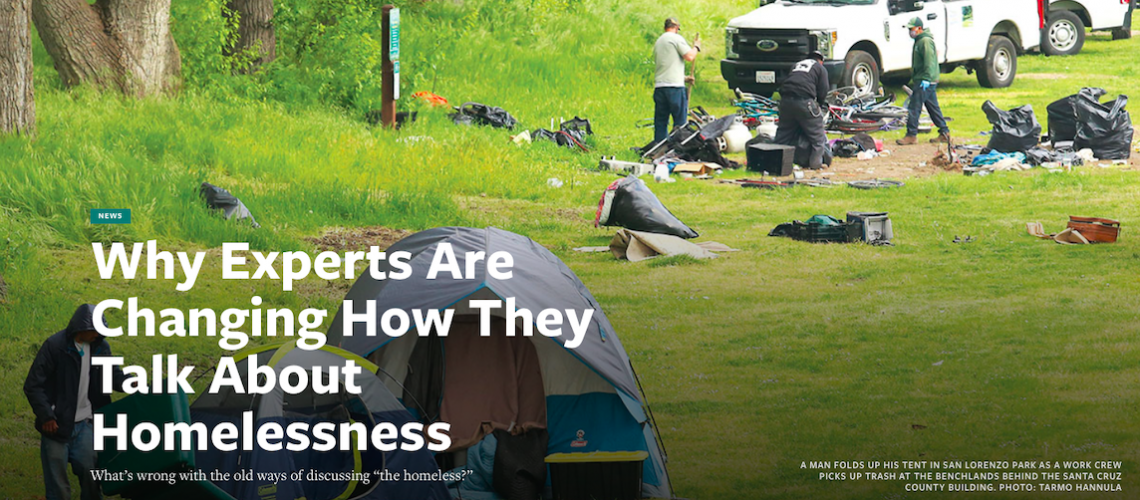By Emily Rangel, Student Intern from Collaborative Human Health and Service Field Program at California State University Monterey Bay (CSUMB)
Reading the article “Why Experts Are Changing How They Talk About Homelessness” by Jacob Pierce of the GoodTimes opened my eyes to stigmas that revolved around particular vocabulary, as stated in the article “Words have power!”. In today’s world, I would like to think we have progressed in our language to be more inclusive but we still need to adapt to language that does not have negative stigmatization in relation to words. For example, my whole life, the term “homeless” is how we have referenced the population of people experiencing homelessness. Although I do not associate a negative connotation to the word “homeless”, others have used it as a form to degrade the experience of this population by casting blame on them. Reading this article has impacted my vocabulary and how I will from now on refer to the population of people experiencing homelessness.
The article states: “Kuhl and many experts on homelessness say that, when community members are careful to use more humanizing language, it can lead to better discussions around the crisis: ‘People experiencing homelessness is a term—embraced by the nonprofit world and local governments—meant to put more focus on the individual and take the stigma out of the crisis that they’re in. Over the past few years, the phrase has become part of the vocabulary of Santa Cruz County and Santa Cruz city officials and at organizations across the region.”
The way one refers to the population experiencing homelessness can be dehumanizing. In a sense, the term “homeless” sometimes cast blame on that one person or the entire population for being in the situation they are currently in, which is not having a permanent residence. Other terms have also been adapted, such as “houseless” or “unhoused,” similarly, these words still need to be used with cautions because they can adapt and inflict a similar connotation as “homeless.” I favor “people experiencing homelessness” because it draws attention to the issue and acknowledged real people face this issue of not having permanent housing. Additionally, Alicia Kuhl brings up the point that she is not “homeless”; she has a Santa Cruz home, she just does not have a permanent housing situation. She speaks of how one’s home should have affordable housing.
The topic of affordable housing resonated with me as a college student who grew up in the Bay Area. I have almost accepted that it would be challenging to live and find housing in the city I love and grew up in, which is why I’m still living at home. I do not want to leave the city which holds many memories but I cannot afford to live in that same city. I have yet to decide to move away and start over but just as explained by Alicia, “You lose more than people think. You would be uprooting your entire life and everything that you’re used to,” Kuhl says. “And sometimes it’s not about saving a little bit of money. It’s about more than that. We need to have places where people can afford in the town where they live, where they’re working, where they’re serving their community—until they can afford a place to live there”. This statement resonates with me, and I’m sure many Californians of my generation have realized many of them will not end up buying homes in their hometowns.
Ultimately, we need to rethink how we discuss and refer to the population experiencing homelessness. The dehumanization of the term “homeless” only focuses on the fact that these people do not have permanent residents; it does not highlight that they are humans who are facing a traumatizing and devastating experience. The article offers a great approach to how we think and discuss this topic and many other topics that have terms that are also dehumanizing, such as substance abuse and Housing Choice Voucher. The article highlights, “But the guide also cautions against using the word to describe a group of people in a way that would imply that they’re some kind of a “singular monolith”. Avoid the dehumanizing collective noun “the homeless,” the Stylebook states, “instead using constructions like homeless people, people without housing or people without homes.” Next time we discuss one of these topics, we should take a step back and think of our words of choice to ensure we are not associating blame and stigma. We acknowledge these are people who are working through difficult times and they are not to blame for the circumstances society has put them in. READ FULL ARTICLE HERE
